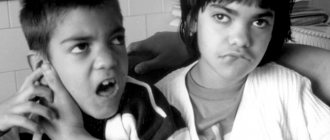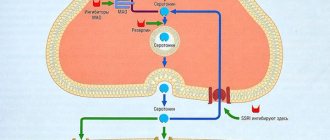Mental retardation (oligophrenia, dementia) is a specific condition caused by a special level of activity of the central nervous system, and not a mental illness.
It is chronic, non-progressive and occurs in connection with organic pathology of the brain. The affected central nervous system limits the intellectual development of the child. As a rule, such a deviation occurs during intrauterine development and is finally formed before three years of age.
Due to various types of brain damage that provoked the breakdown of mental functions, a person can develop oligophrenia even in adulthood. This is called dementia. It should be distinguished from acquired dementia, which refers to a decrease in intelligence due to age-related changes in the brain.
Mental retardation is classified as a severe pathology. However, depending on the form of its development, a specialist can adapt the patient to the surrounding society as much as possible and correct some deficiencies.
The essence of the problem
Mental retardation is a serious limitation in the skills necessary for daily life, social and intellectual activities. Such individuals experience problems with speech, motor development, intelligence, adaptation, emotional-volitional sphere, and cannot interact normally with the environment.
This definition was given by AAIDD - the American Association for Developmental and Intellectual Disabilities, which changed its approach to this problem. It is now believed that providing ongoing, personalized support can improve the quality of life of a mentally retarded person. Yes, the term itself was replaced with a more tolerant and inoffensive one – “intellectual disability”.
In addition, such a disease is now not considered mental. And it should not be confused with developmental disabilities. The latter covers a broader area, but is very closely related to the first: autistic disorders, cerebral palsy, etc.
Oligophrenia is a chronic non-progressive disease that occurs as a result of brain pathology in the prenatal period or after birth (up to three years).
Despite the achievements of modern medicine and serious preventive measures, it cannot give an absolute guarantee that this disease will not appear. Currently, 1 to 3% of people worldwide suffer from UO, but most suffer from a mild form (75%).
There is also acquired mental retardation - dementia. This is a separate “age-related” pathology in older people, a consequence of natural brain damage and, as a result, the collapse of mental functions.
How to make an appointment with a neurologist
Mental retardation requires an integrated approach, so you need to make an appointment with not just one specialist, but several. Initially, it is recommended to see a neurologist, who, after an examination, will determine which doctors the patient still needs. JSC "Medicine" (clinic of academician Roitberg) is located in the center of Moscow near the Mayakovskaya, Novoslobodskaya, Chekhovskaya, Belorusskaya metro stations. You can make an appointment with a neurologist, speech therapist, child psychiatrist and other doctors by phone. Also use the feedback form by sending a request, or request a call back.
Causes
Intellectual disability is the result of genetic diseases and many other factors, or rather, their combination: behavioral, biomedical, social, educational.
| Causes | Factors | |||
| biomedical | social | behavioral | educational | |
| Intrauterine development of the fetus (prenatal) | -age of parents; - diseases in the mother; -chromosomal disorders; -congenital syndromes | the mother's miserable existence, she was subjected to violence, was poorly fed, did not have access to medical services | parents used alcohol, tobacco, drugs | parents are not prepared for the birth of a child, are cognitively incompetent |
| Birth of a child (perinatal) | -prematurity; - birth injuries | poor baby care | child abandonment | lack of medical supervision |
| Later life (postnatal) | -bad Education; -brain injuries; -degenerative diseases; -epilepsy; -meningoencephalitis | -poverty; -poor family relationships | -domestic violence, harshness towards the child, isolation; -failure to comply with safety measures; -bad behavior | -poor quality medical care and late diagnosis of diseases; -lack of education; -lack of support from other family members |
No one can accurately name the specific “culprits,” even despite fairly scrupulous research and early diagnosis. But, if you analyze the table, the most likely cause of oligophrenia may be:
- any genetic failures - gene mutations, their dysfunction, chromosomal abnormalities;
- hereditary developmental disorders;
- malnutrition;
- infectious diseases of the mother during pregnancy - syphilis, rubella, HIV, herpes, toxoplasmosis, etc.;
- premature birth;
- problematic childbirth - asphyxia, mechanical injuries, hypoxia, fetal asphyxia;
- insufficient upbringing of the child from birth, parents devoted little time to him;
- toxic effects on the fetus leading to brain damage - parental use of strong drugs, drugs, alcoholic beverages, smoking. This also includes radiation;
- infectious diseases of the child;
- skull injury;
- diseases affecting the brain - encephalitis, whooping cough, meningitis, chicken pox;
- drowning.
Degrees of mental retardation
Intellectual disability is divided into 4 stages. This classification is based on special tests and is based on the IQ level of intelligence:
- mild (moronicity) – IQ from 70 to 50. Such an individual has impairments in abstract thinking and its flexibility, short-term memory. But he speaks normally, albeit slowly, and understands what is said to him. Often such a person cannot be distinguished from others. But he is not able to use the acquired academic skills, for example, financial management, etc. In social interactions, he lags behind his peers, so he may fall under the negative influence of others. He can perform everyday simple tasks himself, but more complex ones require outside help;
- moderate (not very pronounced imbecility) – IQ 49–35. A person needs constant continuous patronage, including for establishing interpersonal relationships. Spoken speech is very simple, and he does not always correctly interpret what he hears;
- severe (severe imbecility) – IQ from 34 to 20. A person does not understand speech well, numbers, the concept of time is not available to him - for him everything happens here and now. Speaks in monosyllables, vocabulary is limited. Needs constant monitoring and care in terms of hygiene, clothing, nutrition;
- deep (idiocy) – IQ level less than 20. Speech, its understanding and sign language are very limited, but are able to express simple words and instructions, as well as their desires and emotions using non-verbal communication. Severe sensory and motor problems are present. Completely dependent on others.
It should be noted that with long-term and persistent training of people with any degree of dementia, they can achieve basic skills.
Moderate
With a moderate (average) form of mental retardation in children, the IQ level varies from 35 to 49 points. Children with moderate mental retardation differ in appearance from healthy children: their faces are practically devoid of facial expressions, their eyes blink very rarely. Children with moderate mental retardation often have protruding ears and attached lobes, a defective bite, rough facial features, micro- or hydrocephalus, and widely spaced eyes. The gait of such children is slow and stiff, and fine motor skills are very poorly developed. Possible speech defects: stuttering, lisp. Children with a moderate form of mental retardation have serious problems with the perception and expression of information and their own emotions (they experience fear, joy, affection, and can distinguish praise from blame). Memory is very limited and selective. It is possible to teach self-care skills to children with moderate mental retardation, but serious problems arise with schooling. Even reading and basic arithmetic can become an impossible task. The total vocabulary does not exceed 200 - 300 words. Of course, there is no longer any question of receiving any kind of education, but in the future, people with a moderate form of mental retardation can perform some simple work that does not require decision-making. They can live at home, in a family, under the supervision of loved ones. As they grow older, they are assigned to special schools or social institutions, where they can live and do some simple work. If problems with neurology and psyche develop, hospitalization in a psychiatric clinic may be required. – A child suffering from a moderate form of mental retardation needs to be dealt with comprehensively. A neurologist and psychiatrist will prescribe drug therapy that improves brain processes, psychostimulants, and anticonvulsants. Classes with a speech therapist-defectologist are also necessary; training is possible only at home, the oligophrenopedagogist clarifies.
Diagnostic criteria
According to DSM-5 (the fifth edition of the Diagnostic and Statistical Manual of Mental Disorders), intellectual disability is a neurodevelopmental disorder, characterized and defined by the following symptoms:
- Deficits in intellectual functioning. Difficulties with abstract thinking, reasoning, decision making, and learning. All this must be confirmed by appropriate tests.
- Deficit of adaptive behavior. Inconsistency with accepted cultural and social standards, inability to live independently, reduced social responsibility, difficulties with communication. That is, the individual cannot communicate and serve himself and needs care wherever he is.
- A person finds it difficult to perform tasks that require memory, attention, speech, writing, reading, mathematical reasoning, and is unable to gain practical skills.
- Problems in the social sphere. Does not have socialization skills - communication with people, cannot make friends and maintain relationships. Doesn't understand his feelings and thoughts.
- Problems in the practical field. Poor ability to learn skills, lack of control over one’s own behavior, inability to take care of oneself, irresponsibility, etc.
Other signs
Together with the mentioned criteria, the presence of any stage of CP can be determined by the following criteria.
In the primary period of development, a healthy child masters simple skills, which, as they grow older, are well mastered and move on to more complex ones. Adaptive and intellectual problems become noticeable as the child develops. When they appear depends on the type, cause and degree of mental retardation.
The stages of development (motor skills, speech, socialization) of children with intellectual disabilities are the same as those of healthy people, but they progress much more slowly, that is, they reach a certain level much later. With a mild form of mental retardation, the lag behind peers becomes noticeable only at the beginning of school (learning difficulties), and with a severe form - in the first years of life.
As a rule, if intellectual disability is inherited (by genes), it affects the person’s appearance.
Oligophrenics are more likely to have physical, neurological and other health problems. For such individuals, sleep disturbances, anxiety disorders, and schizophrenia are also common. Diabetes, obesity, sexually transmitted diseases, and epilepsy are common.
People with mild to moderate intellectual disabilities speak much less well than their younger peers. The higher the level of disorder, the worse the speech.
Behavioral disorders characteristic of oligophrenics are associated with the discomfort they experience when communicating, the inability to communicate their thoughts to others, and a misunderstanding of their desires and needs. In addition, they suffer from social isolation. This is where manifestations of excitement, anxiety, nervousness, etc. follow.
Diagnostics
Mental development disorders are difficult to detect at an early stage. However, such diagnosis is extremely necessary for early correction and compensation of the detected defect.
The diagnosis of “mental retardation” is made on the basis of special methods that allow assessing the intellectual level of an individual. Sometimes specialists use neuropsychological diagnostics, which allows us to determine the level of development of higher mental functions, as well as assess the child’s potential.
A correctly made diagnosis makes it possible to timely develop corrective methods to eliminate the pathology and treat it. In this case, the doctor must make sure that the little patient does not have signs of progression of underdevelopment or signs of more serious mental illnesses (schizophrenia, schizoaffective disorder, etc.).
It is also important to determine that the patient’s condition is not pedagogical neglect. This often happens to children who have lost their parents and were sent to an orphanage. There they can be subjected to harsh treatment, bullying, violence, etc. But if the child changes the situation for a better one - he is adopted, he lives and is raised in a normal family, then his condition returns to normal.
Syndromes combined with different degrees of MR
Down syndrome is the most common genetic cause of intellectual disability. It is caused by a chromosomal abnormality - if normally there are 46 of them, then in this case there is an unpaired 47th chromosome. People with this syndrome can be identified by an abnormally short skull, flat face, short arms and legs, short stature, and small mouth. They process the information received poorly and remember it, they lack the concept of time and space, and their speech is poor. Moreover, such individuals adapt well to society.
Martin-Bell syndrome (fragile X chromosome). The second most common genetic cause of mental retardation. It is recognized by the following external features: increased mobility of joints, an elongated face, an enlarged chin, a high forehead, large, protruding ears. They start talking late, but poorly, or don’t speak at all. They are very shy, hyperactive, inattentive, constantly moving their hands and biting them. Men have more cognitive impairment in this category than women.
Williams syndrome (“elf face”). It occurs as a result of hereditary chromosomal rearrangement, the loss of genes in one of them. The patients have a very interesting appearance: the face is narrow and long, blue eyes, flat nose, large lips. Usually suffer from cardiovascular diseases. Rich vocabulary, good memory, excellent musical abilities, and social interaction skills. But there are problems with psychomotor skills.
Angelman syndrome (happy doll or Parsley). Caused by a change in chromosome 15. Very light eyes with characteristic spots on the iris and hair, the head is small, the chin is pushed forward, the mouth is large, the teeth are sparse and long. Severe delay in psychomotor development, significant impairment of speech and movement (poor balance, walks on stiff legs). He often smiles and even laughs for no reason.
Prader-Willi syndrome . It is characterized by the absence of a paternal copy of chromosome 15 and a number of other disorders. He is short in stature, has small arms and legs, suffers from compulsive overeating, and, as a result, obesity. Problems with short-term memory, speech, information processing.
Lejeune's syndrome (cry of the cat or 5p syndrome). A very rare and serious disease caused by the absence of the short arm of chromosome 5. The head is small, the face is round, the lower jaw is underdeveloped and the bridge of the nose is wide, so the eyes are located far from each other. The feet are turned out, the hands are small. The larynx is underdeveloped, there are vision problems, in particular, strabismus. She often cries and makes a sound similar to a kitten meowing. Motor development is delayed, and the ability to pay attention is limited.
In addition to the syndromes mentioned, intellectual disability can coexist with cerebral palsy, deafness and blindness, autistic disorders, epilepsy and other somatic and mental illnesses.
How to identify mental retardation disorders: signs and symptoms of delayed psycho-speech development
ZPRD, if it is caused by congenital factors, can begin to manifest itself at a fairly early age of the child.
Signs of delayed psycho-speech development:
- 4 months : the child does not respond to the words and gestures of the parents, does not smile (these are also symptoms of autism);
- 8–9 months : absence of babbling (repetition of identical syllables);
- 1 year : the child is very quiet, makes almost no sounds;
- 1.5 years : does not speak simple words (“mom”, “give”) and does not perceive them, does not understand when addressed by name or with a request; may also not be able to chew;
- 2 years : knows and uses a very limited set of words, does not repeat new words after others;
- 2.5 years : uses no more than 20 words, cannot form a phrase out of two or three words, does not understand the names of body parts and objects;
- 3 years : cannot form a sentence on his own, does not understand simple stories from adults. Speaks too quickly, “swallowing” endings, or too slowly, drawing out words. In response to an adult’s address to him, he can repeat what was said verbatim.
A child with PVD at any age may experience increased salivation and an always slightly open mouth. Such children are characterized by hyperactivity, increased aggressiveness, inattention, fatigue, and poor memory. The child thinks very slowly, has an undeveloped imagination and a narrow range of emotional manifestations, experiences great difficulties in communicating with peers, and therefore avoids them. Physically, such children are also poorly developed and may even have cerebral palsy.
Symptoms of ZPRD also manifest themselves in organic changes. When examined using electroencephalography (EEG) or the evoked potentials (EP) method, disturbances are detected in the left hemisphere (it is responsible for speech development).
In general, the longer a child experiences difficulties with speech, the more his mental and mental development is delayed. After all, the older children are, the more information they receive from what they are told in dialogues with others. This is another reason to start treatment for PVD as early as possible.
Children with intellectual disabilities
Society must be tolerant of people with mental retardation; a special approach and teachers are needed who know the specifics of the work, who can give intellectual disabilities an education and help them realize their potential.
Children with disabilities need the support of others, especially parents, who must provide such children with psychological comfort, development, and improve their quality of life.
In infants, it is quite difficult to identify mental retardation, especially its mild form, since they are almost no different from others. But their activity is impaired: they begin to hold their heads up late, babble, sit, and crawl.
But as the child grows up, when he begins to go to kindergarten, it becomes noticeable that he has difficulty maintaining a daily routine, communicating with peers, and mastering new skills. For example, a three-year-old child cannot assemble a pyramid on his own, although he repeated this many times with the teacher. My classmates succeeded after 1-2 lessons.
Oligophrenic children are not inquisitive; they cannot sit in one place for a long time, but they get tired very quickly. Their speech is poor, they confuse letters (especially consonants). Since their phonemic hearing and analysis are poorly developed, they pronounce words incorrectly, and then write incorrectly. The development of auditory discrimination and the articulatory speech apparatus lags behind - hence slurred speech.
Gross and fine motor skills suffer as the central nervous system develops abnormally. The baby's movements are uncertain and sluggish, he manipulates objects chaotically. For a long time he cannot determine the “main” hand; he moves both of them inconsistently.
Difficulties with the “pinch” and “tweezer” grip do not allow the child to hold a pencil and pen correctly and learn to write. Underdevelopment of fine motor skills also makes it difficult to care for oneself.
The child cannot concentrate and remember something. This negatively affects cognitive activity and mental activity. The baby does not see or hear what is said to him due to attention problems.
Studying is difficult for such children: they learn the material slowly because they do not remember it and cannot reproduce the information received. They cannot apply the skill or knowledge they have learned after repeated repetitions and quickly forget it.
The child is not able to express feelings verbally, because he has poor speech, but he expresses emotions through facial expressions, touches, and gestures. He is incapable of empathy. His will is weak, so he is trusting of any person, easily suggestible, and this is very dangerous.
Contact a specialist (neurologist) without delay if your child behaves unusually or you do not understand what is happening to him. The benefit of this is double - in the best case, all doubts about the adequacy of your child will be dispelled, and in the worst case (which, however, is also not bad) - early diagnosis will allow you to immediately take measures to solve the problem. This will allow such a child to be better socialized and adapted to life.
The doctor will examine the little patient, ask the parents about the symptoms, when they appeared, about the child’s practical and social skills, adaptive behavior, etc. An intelligence test is required to find out how teachable the child is, how he can solve problems and think abstractly. An IQ below 70 may indicate the presence of intellectual disability and its level.
Tips for parents
The following recommendations can be given to mothers and fathers of special children:
- Of course, hearing such a diagnosis for your child is a terrible blow, causing negative thoughts. There is a feeling of guilt, resentment at fate, anger, despair, melancholy. But you still have to accept this fact, come to terms with it, and communication with other parents who have a similar problem can be a good support. It’s also a good idea to visit a psychologist.
- You need to clearly separate your capabilities from what is impossible to do and, without giving up, look for ways to solve problems and means.
- Consult with specialists. It is also advisable to collect as much information as possible from serious sources about mental retardation, how and how you can help the child, what exactly should be done, where to go. The experience of families with an oligophrenic child is invaluable, communicate with them.
- Learn about and take advantage of government and community services for families with children with mental retardation.
- Think not about limitations, but about your child’s capabilities, what he can do and what he needs, how to please him. It is in your power to help him become independent and socialize as much as possible.
- Under no circumstances isolate your child from other people, neither children nor adults.
- Despite the fact that the level of development of your child at certain stages is lower than that of his peers, you need to communicate with him not as with a baby, but in accordance with his age.
- It is necessary to regularly conduct developmental and training sessions. The goal of education is social adaptation, that is, the child must master speech, writing, and everyday independence.
Don’t expect anything special from all your efforts, some super-result, be happy with the smallest progress. But we shouldn’t stop there either. Even if you understand your child by individual words, this is not enough for communication with others and social adaptation. Move on, don't give up and don't indulge your child's laziness.
To reduce the likelihood of having a mentally retarded child, a pregnant woman should:
- DO NOT drink, smoke or take drugs;
- take folic acid;
- visit a doctor regularly;
- Eat a diet containing fruits and vegetables, whole grains, and foods low in saturated fat.
After the baby is born:
- carry out screening of the baby - this will identify diseases that can provoke mental retardation;
- visit your pediatrician regularly;
- do all scheduled vaccinations;
- allow him to ride a bicycle only with a helmet, and to ride in a car until the required age only in a car seat;
- Avoid contact of your child with household chemicals and lead-based paints.
Support by specialists
A child with an intellectual disability needs comprehensive support throughout childhood from the following specialists:
- child psychologist and psychiatrist;
- speech therapist;
- neurologist;
- speech pathologist.
If there are other disorders (blindness, deafness, cerebral palsy, autism spectrum disorder), then a rehabilitation specialist, an ophthalmologist, a massage therapist, and a physical therapy teacher are added to the above-mentioned professionals.
Features of childhood dementia
Preschool age only forms a personality, which is characterized by many factors: developmental characteristics, temperament, individuality.
Only after the child goes to school can parents identify a developmental disorder. Such children practically do not master the program. It is not possible to attract the attention of oligophrenics and fix it on something. Difficulties arise with memorization and retelling—children suffering from ID are unable to retain received information in memory for a long time.
A “special” student usually does not understand the essence of the task and does not grasp the connections between things and phenomena. It is very easy to intimidate him in such a situation: you just have to shout, and the psychological trauma that follows the stress is inevitable.
Depending on the environment, such a child can develop into two completely different personality types:
- kind and sympathetic, ready to help at any moment, vulnerable and warm-hearted;
- embittered and aggressive, who, having no desires and feelings of their own, are subject to the negative influence of others.
A practicing psychotherapist shared the story of a boy who was doomed to mental illness while still in utero development. A dysfunctional mother carried a child in violation of all acceptable rules: she smoked, drank alcoholic beverages, and took psychotropic drugs. After the birth of the child, he was deprived of proper attention.
After some time, the visiting nurse noticed some mental underdevelopment of the baby: he could not hold his head up on his own and did not make any sounds. Thanks to the prompt and coordinated work of medical workers, the boy was saved. And at the moment it has practically adapted to modern living conditions.
A predisposition to mental illness or unacceptable behavior of a pregnant woman is a reason to warn her about the possible dementia of the unborn child.
However, a loving and caring mother who leads a healthy lifestyle and has absolutely no prerequisites for the occurrence of mental pathologies can also face the problem of dementia in her child.
Having noticed the first alarm bells, which are a definite reason for consultation, you must immediately contact a qualified specialist. This will give you the opportunity to deeply adapt your baby to society before the moment of his socialization.
Is oligophrenia curable?
Treatment and correction of this disease is not an easy task; it will require a lot of effort, time, and patience. In addition, different levels of mental retardation and the age of the patient require their own methodology. However, if the tactics are chosen correctly, a positive result becomes noticeable within a couple of months.
Unfortunately, complete relief from intellectual disability is impossible. The thing is that certain parts of the brain are damaged. The nervous system to which it belongs is formed during the period of intrauterine development of the fetus. After the birth of a child, its cells almost do not divide and are not able to regenerate. That is, the damaged neurons will not recover and mental retardation remains with the person for the rest of his life, although without progressing.
But, as already mentioned, children with a mild degree of the disease respond well to correction, receive self-care skills, education, and can work quite normally, performing simple tasks.
Support for people with disabilities
This disease develops in different ways, but it is very important to diagnose it as early as possible. In this case, specialists will begin to work closely with such a patient at an early age, which significantly improves his condition and quality of life.
Such assistance is necessarily personalized, that is, it is planned taking into account the individual characteristics of the patient, his needs and desires. People with this diagnosis are not the same, therefore, help for each of these individuals in the sphere of life and certain activities should have its own type and intensity.
In many countries of the world, including ours, special programs have been developed whose goal is to improve the quality of life of people with mental retardation. They are integrated, “dissolved” in society. Children with mild degrees of the disease go to auxiliary schools and kindergartens, inclusive classes in regular educational institutions. There are even groups in vocational schools where you can get an education and then work in your specialty.
Danger of mental retardation
By and large, mental retardation does not pose a threat to the life and health of either the child himself (unless it is a consequence of a serious illness) or those around him. In this case, it is more correct to talk about the difficulties and inconveniences that may arise for children with mental retardation and their environment.
Children with mental retardation find it more difficult to adapt to society and have learning difficulties. If mental retardation is not corrected, this can lead to loss of educational motivation and social maladjustment. Every year it will be more and more difficult for the child to be with peers, he will remain in the same class for the second year, his behavior will continue to remain at a low level of development.
As for others, if a child with mental retardation ends up in a regular class of a general education school, and no corrective measures are applied to him, then this may interfere with the learning process of other children. Children with mental retardation are often distracted in class and can distract the teacher and other children. They may play during class or get up and walk around the room without the teacher's permission. All this complicates the educational process and can cause a negative attitude towards such a student both from teachers and from classmates.
That is why it is recommended to send the child either to special classes, or to carry out correctional measures before the start of education, so that the child himself can easily adapt to the school environment and does not complicate the learning process of other children.











